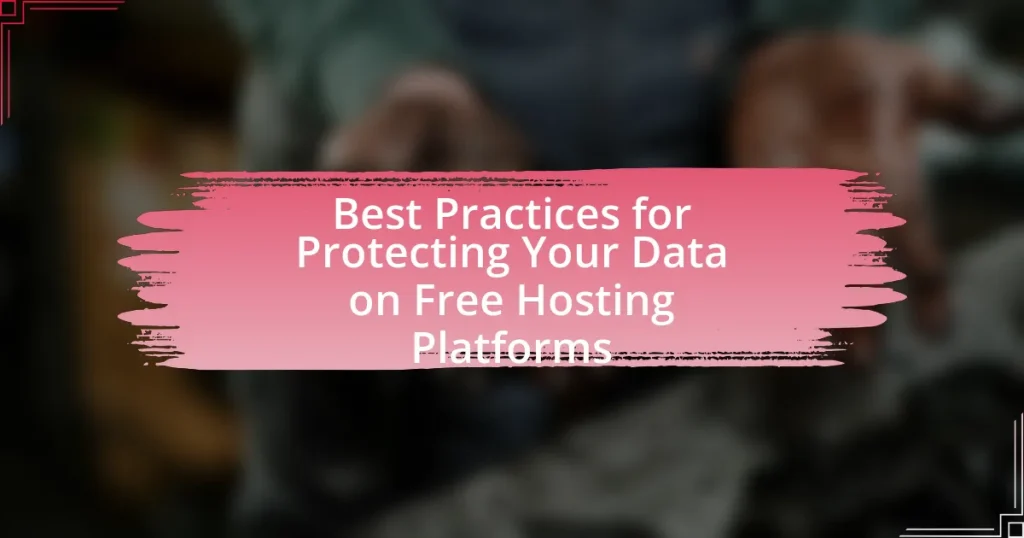The article focuses on best practices for protecting data on free hosting platforms, highlighting the significant risks associated with inadequate security measures, data loss, and lack of customer support. It outlines how free hosting services often compromise data security through limited encryption, unpatched vulnerabilities, and shared resources, leading to potential data breaches. The article emphasizes the importance of data protection, detailing the types of sensitive information at risk and the severe consequences of data loss for individuals and businesses. Additionally, it provides practical tips for enhancing data security, including the use of strong passwords, two-factor authentication, encryption, and regular backups, as well as recommending tools and resources available for safeguarding data on these platforms.

What are the risks of using free hosting platforms for data protection?
Using free hosting platforms for data protection poses significant risks, including inadequate security measures, data loss, and lack of customer support. Free hosting services often do not implement robust encryption protocols or regular security updates, making user data vulnerable to breaches. According to a 2021 study by the Cybersecurity & Infrastructure Security Agency, 60% of free hosting platforms were found to have critical vulnerabilities that could be exploited by attackers. Additionally, these platforms may impose limitations on data backups, increasing the risk of permanent data loss. Furthermore, the absence of reliable customer support can hinder users’ ability to recover from incidents, leaving them without assistance during critical situations.
How do free hosting platforms compromise data security?
Free hosting platforms compromise data security primarily by offering limited encryption and inadequate protection against cyber threats. These platforms often do not implement robust security measures, such as SSL certificates, which are essential for encrypting data during transmission. Additionally, they may lack regular security updates and patches, leaving users vulnerable to exploits. A study by the Ponemon Institute found that 60% of free hosting services do not provide adequate security protocols, increasing the risk of data breaches. Furthermore, free hosting platforms may monetize user data through advertising, exposing sensitive information to third parties.
What common vulnerabilities exist in free hosting services?
Common vulnerabilities in free hosting services include inadequate security measures, lack of regular updates, and shared resources that expose users to risks. Inadequate security measures often result in weak authentication protocols, making it easier for attackers to gain unauthorized access. Additionally, many free hosting providers do not implement regular updates or patches, leaving systems vulnerable to known exploits. The shared nature of resources in free hosting environments can lead to cross-site scripting (XSS) and cross-site request forgery (CSRF) attacks, as malicious users can exploit vulnerabilities in one site to affect others on the same server. These factors collectively contribute to a higher risk of data breaches and service disruptions for users relying on free hosting services.
How can data breaches occur on these platforms?
Data breaches on free hosting platforms can occur due to inadequate security measures, such as weak passwords, lack of encryption, and unpatched vulnerabilities. These platforms often prioritize cost over security, making them attractive targets for cybercriminals. For instance, a study by Verizon in 2020 indicated that 81% of data breaches involved stolen or weak passwords, highlighting the critical role of password security. Additionally, many free hosting services do not implement robust encryption protocols, leaving sensitive data exposed during transmission. Furthermore, unpatched software vulnerabilities can be exploited by attackers, as seen in the 2017 Equifax breach, which resulted from a failure to address known security flaws.
Why is data protection crucial when using free hosting?
Data protection is crucial when using free hosting because free hosting services often lack robust security measures, making user data vulnerable to breaches and unauthorized access. Many free hosting providers do not offer encryption, regular backups, or comprehensive privacy policies, which increases the risk of data loss or theft. According to a 2021 report by Cybersecurity Ventures, 60% of small businesses that experience a data breach go out of business within six months, highlighting the severe consequences of inadequate data protection. Therefore, users must prioritize data protection to safeguard their information and maintain business continuity.
What types of sensitive data are at risk?
Sensitive data at risk includes personal identification information, financial data, health records, and login credentials. Personal identification information, such as Social Security numbers and addresses, can lead to identity theft. Financial data, including credit card numbers and bank account details, is vulnerable to fraud. Health records contain sensitive medical information that can be exploited for various malicious purposes. Login credentials, such as usernames and passwords, are often targeted for unauthorized access to accounts. According to the Identity Theft Resource Center, data breaches exposing sensitive information have increased significantly, highlighting the urgency of protecting such data on free hosting platforms.
How can the loss of data impact individuals and businesses?
The loss of data can severely impact individuals and businesses by leading to financial losses, reputational damage, and operational disruptions. For individuals, losing personal data can result in identity theft, loss of sensitive information, and emotional distress. For businesses, data loss can lead to significant financial costs; for instance, a study by IBM found that the average cost of a data breach is $4.24 million. Additionally, businesses may face legal repercussions and loss of customer trust, as 87% of consumers will not do business with a company after a data breach. Operationally, data loss can halt productivity and disrupt services, leading to further financial implications.

What best practices can enhance data protection on free hosting platforms?
To enhance data protection on free hosting platforms, users should implement strong password policies, utilize encryption, and regularly back up data. Strong passwords, consisting of a mix of letters, numbers, and symbols, significantly reduce the risk of unauthorized access; studies show that 81% of data breaches are linked to weak passwords. Encryption protects sensitive data both in transit and at rest, ensuring that even if data is intercepted, it remains unreadable without the decryption key. Regular backups safeguard against data loss due to accidental deletion or cyberattacks, with 30% of users reporting data loss incidents. By following these best practices, users can significantly improve their data security on free hosting platforms.
How can users secure their accounts on free hosting platforms?
Users can secure their accounts on free hosting platforms by implementing strong, unique passwords and enabling two-factor authentication (2FA). Strong passwords should consist of at least 12 characters, including a mix of uppercase letters, lowercase letters, numbers, and special symbols, which significantly reduces the risk of unauthorized access. According to a study by the National Institute of Standards and Technology, using complex passwords can decrease the likelihood of successful brute-force attacks. Additionally, enabling 2FA adds an extra layer of security by requiring a second form of verification, such as a text message or authentication app, which can prevent unauthorized logins even if a password is compromised.
What role do strong passwords play in data protection?
Strong passwords are essential for data protection as they significantly reduce the risk of unauthorized access to sensitive information. A strong password typically includes a combination of upper and lower case letters, numbers, and special characters, making it difficult for attackers to guess or crack through brute force methods. According to a study by the National Institute of Standards and Technology (NIST), weak passwords are a leading cause of data breaches, with over 80% of hacking-related incidents attributed to compromised passwords. Therefore, implementing strong passwords is a critical measure in safeguarding data, particularly on free hosting platforms where security may be less robust.
How can two-factor authentication improve security?
Two-factor authentication (2FA) significantly improves security by requiring users to provide two distinct forms of identification before accessing an account. This additional layer of security makes it more difficult for unauthorized individuals to gain access, even if they have obtained the user’s password. According to a study by Google, implementing 2FA can block 100% of automated bots and 96% of targeted attacks, demonstrating its effectiveness in safeguarding sensitive information.
What measures can be taken to protect data during storage?
To protect data during storage, implementing encryption is essential, as it secures data by converting it into a format that is unreadable without the correct decryption key. Additionally, using access controls ensures that only authorized users can access sensitive information, thereby reducing the risk of unauthorized access. Regularly updating software and security protocols is crucial, as it protects against vulnerabilities that could be exploited by attackers. Furthermore, employing data redundancy through backups safeguards against data loss due to hardware failures or cyber incidents. According to a 2021 report by the Ponemon Institute, organizations that implement encryption and access controls experience 50% fewer data breaches, highlighting the effectiveness of these measures in protecting stored data.
How does data encryption safeguard sensitive information?
Data encryption safeguards sensitive information by converting it into a coded format that is unreadable without a decryption key. This process ensures that even if unauthorized individuals access the data, they cannot interpret it without the necessary credentials. For instance, the Advanced Encryption Standard (AES) is widely used and recognized for its effectiveness in protecting data, as it employs complex algorithms that make it extremely difficult to break. According to the National Institute of Standards and Technology (NIST), encryption is a critical component of data security, as it helps maintain confidentiality and integrity, thereby reducing the risk of data breaches and unauthorized access.
What are the benefits of regular data backups?
Regular data backups provide essential protection against data loss, ensuring that information can be restored in case of hardware failure, accidental deletion, or cyberattacks. By implementing a consistent backup strategy, individuals and organizations can minimize downtime and maintain business continuity. According to a study by the National Cyber Security Alliance, 60% of small businesses that experience a data breach close within six months, highlighting the critical need for reliable backups to safeguard against such risks. Regular backups also facilitate compliance with data protection regulations, as they ensure that sensitive information is securely stored and retrievable.

What tools and resources are available for data protection on free hosting platforms?
Free hosting platforms typically offer several tools and resources for data protection, including SSL certificates, automated backups, and content delivery networks (CDNs). SSL certificates encrypt data transmitted between users and the server, enhancing security. Automated backups ensure that data can be restored in case of loss, while CDNs help mitigate DDoS attacks and improve load times, indirectly contributing to data integrity. Additionally, many free hosting services provide user access controls and security plugins to further safeguard data. These features collectively enhance the overall security posture of websites hosted on free platforms.
What software solutions can enhance data security?
Software solutions that can enhance data security include encryption software, firewalls, antivirus programs, and data loss prevention tools. Encryption software, such as VeraCrypt, protects sensitive data by converting it into unreadable code, ensuring that unauthorized users cannot access it. Firewalls, like those provided by Cisco or Fortinet, monitor and control incoming and outgoing network traffic based on predetermined security rules, effectively blocking potential threats. Antivirus programs, such as Norton or McAfee, detect and remove malicious software that could compromise data integrity. Data loss prevention tools, such as Digital Guardian, help organizations prevent data breaches by monitoring and controlling data transfers. These solutions collectively strengthen data security by addressing various vulnerabilities and threats.
How do antivirus and anti-malware tools protect data?
Antivirus and anti-malware tools protect data by detecting, preventing, and removing malicious software that can compromise system integrity and data security. These tools utilize signature-based detection to identify known threats and heuristic analysis to recognize suspicious behavior, thereby blocking potential attacks before they can access sensitive information. For instance, according to a report by AV-TEST, antivirus software can prevent up to 99% of known malware threats, significantly reducing the risk of data breaches. Additionally, real-time scanning features continuously monitor files and applications, ensuring that any malicious activity is addressed immediately, further safeguarding user data on free hosting platforms.
What role do firewalls play in securing hosted data?
Firewalls play a critical role in securing hosted data by acting as a barrier between trusted internal networks and untrusted external networks. They monitor and control incoming and outgoing network traffic based on predetermined security rules, effectively preventing unauthorized access and potential data breaches. For instance, according to a report by the Cybersecurity & Infrastructure Security Agency, firewalls can block malicious traffic and filter out harmful data packets, thereby safeguarding sensitive information stored on hosted platforms. This functionality is essential for maintaining the integrity and confidentiality of data, especially in environments where free hosting services may lack robust security measures.
How can users stay informed about data protection best practices?
Users can stay informed about data protection best practices by regularly following reputable sources such as government websites, cybersecurity organizations, and industry publications. For instance, the Federal Trade Commission (FTC) provides guidelines and updates on data protection, while organizations like the International Association for Privacy Professionals (IAPP) offer resources and training on privacy laws and best practices. Additionally, subscribing to newsletters from these organizations can ensure users receive timely information on emerging threats and protective measures.
What online resources provide guidance on data security?
Online resources that provide guidance on data security include the National Institute of Standards and Technology (NIST), which offers comprehensive frameworks and guidelines for managing cybersecurity risks. Additionally, the Cybersecurity & Infrastructure Security Agency (CISA) provides resources and best practices for protecting sensitive information. The Federal Trade Commission (FTC) also offers consumer education materials on data protection and privacy. These organizations are recognized for their authoritative information and practical advice on securing data effectively.
How can community forums and user groups assist in data protection?
Community forums and user groups assist in data protection by providing a platform for sharing knowledge, experiences, and best practices related to data security. These forums enable users to discuss vulnerabilities, share solutions, and report incidents, which collectively enhance the community’s awareness of potential threats. For instance, a study by the Ponemon Institute found that organizations with active user communities experienced 30% fewer data breaches due to shared insights on security measures. Additionally, community-driven resources, such as guides and toolkits, empower users to implement effective data protection strategies tailored to specific free hosting platforms.
What are practical tips for maintaining data security on free hosting platforms?
To maintain data security on free hosting platforms, users should implement strong password policies, regularly update software, and utilize encryption. Strong passwords, consisting of a mix of letters, numbers, and symbols, significantly reduce the risk of unauthorized access, as studies show that 81% of data breaches are linked to weak passwords. Regular software updates patch vulnerabilities, which is crucial since 60% of breaches exploit known vulnerabilities. Additionally, using encryption for sensitive data ensures that even if data is intercepted, it remains unreadable, thereby protecting user information effectively.















